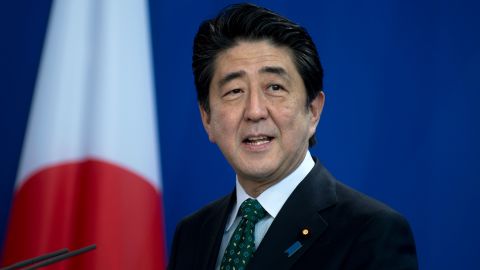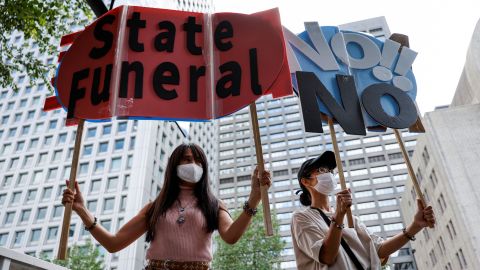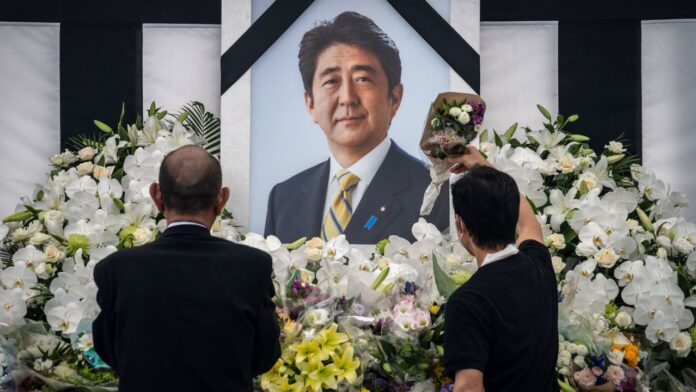Japan bid farewell to former Prime Minister Shinzo Abe in an elaborate state funeral Tuesday, despite public opposition to the cost of the event as the country grapples with their late leader’s legacy.
Abe, Japan’s longest-serving prime minister, was shot dead during a campaign speech in Nara in July, stunning a nation where gun violence is extremely rare.
More than 4,300 guests attended the service at the Nippon Budokan Arena in Tokyo, including foreign dignitaries such as US Vice President Kamala Harris, Indian Prime Minister Narendra Modi and Australian Prime Minister Anthony Albanese.
Abe’s ashes were carried into the venue, where the government played a video tribute honoring his life and career. Prime Minister Fumio Kishida then delivered a memorial address, praising Abe’s “courage” and dedication.
Other government figures including former Prime Minister Yoshihide Suga – who was Abe’s right hand man for many years – also gave remarks, before attendees laid flower offerings and bowed in turn.

Then-Japanese Prime Minister Shinzo Abe addresses the media during a news conference in 2014.
Other ceremonial rites on the program include an honor guard, gun salute, and musical performances, before a government reception for visiting foreign dignitaries.
Japan fears health system overload as case numbers reach record high
Hong Kong removes international travel quarantine after more than two years
Police ramped up security for the event, with public broadcaster NHK reporting that about 20,000 police officers were deployed to keep the peace. But altercations broke out anyway between police and demonstrators outside the funeral venue
On Tuesday morning, crowds of people lined up outside designated memorial sites to leave flowers and pay their final respects to Abe, who dominated Japanese politics for a generation.
But as they mourned, thousands of others took to the streets in anti-funeral protests across Tokyo, illustrating a deep public divide over the occasion, Japan’s first state funeral for a Japanese leader since 1967.
Some crowds chanted slogans as they marched near the funeral venue, waving banners that urged a stop to the proceedings. Protest leaders rallied the crowd through loudspeakers, and a van rolled past with music blasting from a boom box.

People hold up signs during a protest against Japan’s state funeral for former Prime Minister Shinzo Abe in Tokyo on September 27.Issei Kato/Reuters
The protests grew tense at times, with several loud confrontations and scuffles between demonstrators and police.
Abe’s death sent shock waves through Japan and the international community, with thousands of mourners gathering in Tokyo in July as his private funeral took place. But in the months since his assassination, the outpouring of grief has given way to a growing discontent.
Abe’s state funeral comes as the country grapples with rising inflation and anger stemming from revelations that half of Japan’s ruling party members had ties with the controversial Unification Church which has faced backlash over fundraising practices.
Some critics have also pointed to Abe’s more unpopular policies while in office as a reason for the shift in mood, and questioned why so much taxpayer money is going to the state funeral – which will cost some $12 million (1.66 billion yen) – at a time of acute economic strain.
“It was a tragedy that Abe was gunned down and lost his life, but we shouldn’t make him a hero out of this tragedy,” one protester, Shinsaku Nohira, told CNN at a recent anti-state funeral demonstration outside Japan’s parliament.

